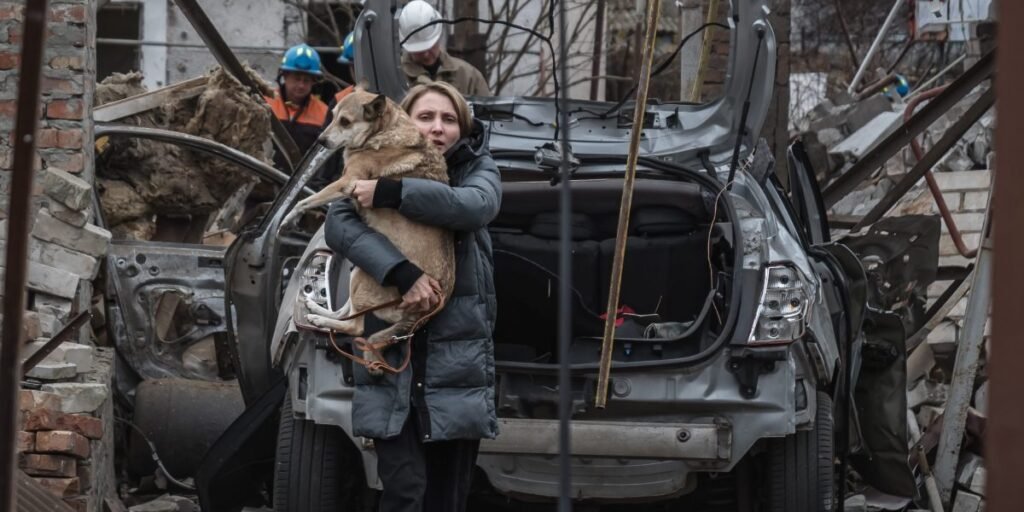
The election of Donald Trump has already redrawn the electoral map of America, but Trump’s foreign policy agenda will likely have far-reaching consequences for the geopolitical map of Europe as well.
Since 2016, Mr Trump has proposed major departures from business as usual: reducing America’s participation in NATO, making significant concessions to Vladimir Putin’s Russia and even buying Greenland. Now that Trump has won, what’s next? If Ukraine cannot withstand a Russian invasion, nor can it count on Western support, who is to say that the Baltics would be spared a similar invasion from Moscow?
With more experience, the self-confidence of a popular mandate, and a deep bank of loyalists willing to fill the ranks of the US State Department, American voters and European politicians must consider the security implications for Europe, and how to preserve democracy. in the region
The most immediate change under a second Trump administration will be a reduction in US military and economic aid to Ukraine. Trump has repeatedly criticized America’s level of involvement in the conflict, suggesting that Europe should take more responsibility for its own defense.
During his previous term, Trump often expressed frustration with European allies, accusing them of not contributing enough to their security, especially NATO, and calling on Russia to “do whatever the hell they want” to any NATO country that doesn’t pay. his fair share. This might be true for the EU’s “old European” members, such as France, Germany and Italy, but not for the new Eastern members. With both Estonia and Poland spending an even higher percentage of their GDP on defense than Trump’s isolationist stance promising less (or no) US funding, the future of regional warfare looks very different.
Trump’s transactional approach to foreign policy will force Ukraine to make territorial concessions to end the war. This could lead to pressuring Ukraine to relinquish control of Russian-occupied territories such as Crimea and the Donbas, jeopardizing Ukraine’s sovereignty and territorial integrity. Such a move would not only embolden Putin, but also set a dangerous precedent for other authoritarian regimes seeking to expand their influence through military aggression. Such a policy shift would also abandon a fundamental principle of the post-World War II order: borders cannot be changed by force or the threat of force.
Trump’s next term also puts the Baltics within Putin’s reach. A weakened NATO, as a result of US involvement in Ukraine, would have major consequences for European security. Countries on NATO’s eastern flank, including Poland and the Baltic states, would be particularly vulnerable. These nations have been among Ukraine’s supporters and have significantly increased their defense budgets in response to Russian aggression.
Putin has made no secret of his desire to reassert Russian influence in former Soviet territories. A lukewarm response from the West, such as the lack of US leadership in NATO or continued military aid to Kyiv, will push Putin into Central Europe.
Finally, Trump will divide Europe’s long-term response to the war. Recent electoral gains by far-right parties across the continent suggest that public opinion in some countries is shifting towards appeasement of Russia. In Austria, France and Germany, right-wing parties have already made significant gains by capitalizing on fatigue from rising energy and food prices caused by sanctions against Russia. If Trump were to reduce US involvement in Ukraine, as he has suggested, these parties could be encouraged to push for similar policies in their own governments.
Such fragmentation could undermine the European Union’s unified stance against Russian aggression, which has been ironclad since the end of the Cold War. Countries with authoritarian tendencies, such as Viktor Orbán’s Hungary, have already expressed a willingness to break ranks with Brussels on issues related to Russia.
A divided Europe will struggle to maintain pressure on Moscow through sanctions or military aid to Ukraine, leading to a fractured response with serious security implications not only across the continent, but anywhere in the world where authoritarian governments seek to forcibly change borders.
More comments posted by this one should be read luck:
Opinions expressed in Fortune.com comments are solely those of the authors and do not necessarily reflect their views and beliefs. luck.

